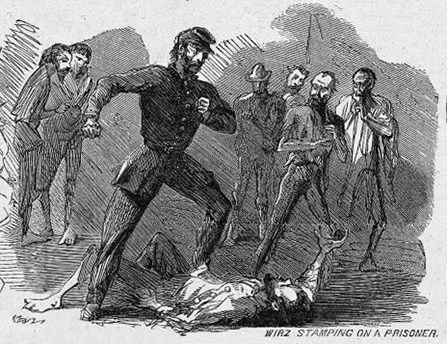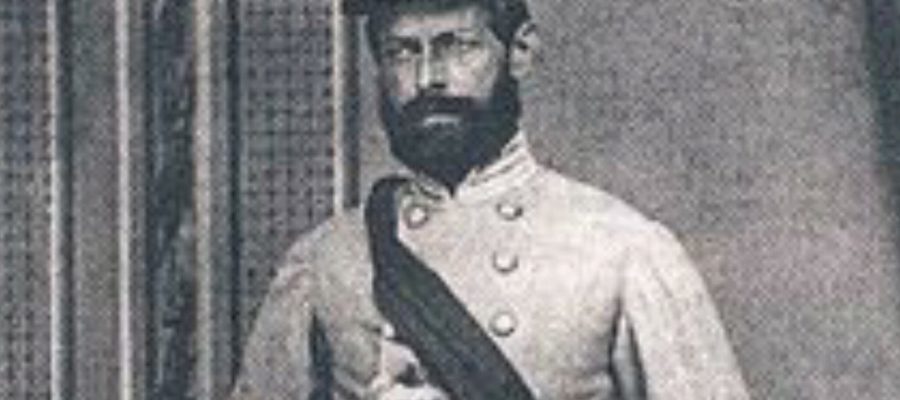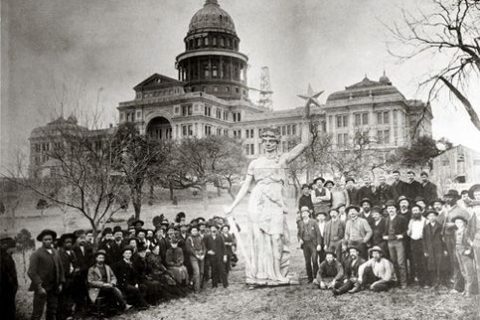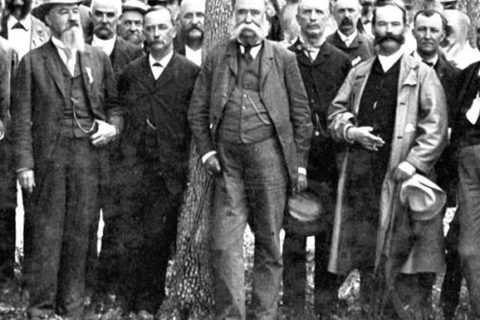Overcrowded, unsanitary, with inadequate food and water, Camp Sumter near Andersonville, Georgia was a ghastly sight. 13,000 of the 45,000 prisoners held there died of scurvy, diarrhea, and dysentery. It was a situation so horrible that it prompted the Union government to inflict similar conditions upon Confederate POWs and charge Captain Henry Wirz with war crimes, which led to his execution.
The Union and many historians lay the blame of Camp Sumter’s conditions on Captain Wirz, some even claim it was deliberate. What these historians seem to overlook, or flat out ignore, is that the prison guards were also malnourished and Captain Wirz even contacted the Confederate government and informed them of the conditions they faced and requested more supplies and was denied. The Confederacy even offered to release the prisoners in the summer of 1864 if the Union would retrieve them.
At his trial, 160 witnesses testified; this included prisoners, Confederate soldiers, and nearby citizens. 145 of the witnesses testified that they did not witness Wirz killing anyone. A number of former prisoners testified about the conditions, even accusing Captain Wirz of acts of cruelty, for some of which he was not present at the camp, and the rest remaining hearsay because of a lack of evidence and particulars. Among the witnesses giving testimony was Father Peter Whelan, a Catholic priest who worked with the inmates and testified on Wirz’s behalf. General Robert E. Lee was also called to testify and according to Fitzhugh Lee, the nephew of the General, “[Lee] knew the captain had done all that was possible with the resources at his disposal; subsistence for them had been most difficult to procure, their exchange for an equal number of Southerners had been refused, while the Federal blockade kept out medical supplies.”
Wirz presented evidence that he had pleaded to Confederate authorities to try to get more supplies and that he had tried to improve the conditions for the prisoners inside but it fell on deaf ears. Wirz asked for clemency in a letter to U.S. President Andrew Johnson, but the letter went unanswered. Despite the overwhelming majority of the testimonies being in his favor, Wirz was found guilty of conspiracy and 11 of 13 counts of acts of personal cruelty.

The night before his execution, Louis Schade, an attorney working on behalf of Wirz, was told by an emissary from a high Cabinet official that if Wirz would implicate Jefferson Davis in the atrocities committed at Andersonville, his sentence would be commuted. Schade relayed the offer to Wirz who replied, “Mr. Schade, you know that I have always told you that I do not know anything about Jefferson Davis. He had no connection with me as to what was done at Andersonville. If I knew anything of him I would not become a traitor against him, or anybody else, even to save my life.”
Wirz was hanged at 10:32 a.m. on November 10, 1865, at the Old Capitol Prison. His neck did not break from the fall, and the crowd of 200 spectators guarded by 120 soldiers watched as he writhed and slowly suffocated. He was buried in the Mount Olivet Cemetery in Washington, D.C. Wirz was one of two men tried, convicted, and executed for war crimes during the War of Northern Aggression; the other being Champ Ferguson.

Crawling out of the Everglades and guzzling a Monster energy drink.






What a coincidence! I just posted a short comment not two minutes ago over at Occidental Dissent reminding commenter “SpawnRanch” not to forget about what happened to Captain Wirz in his (SpawnRanch’s) lamentations over the murder of Mary Surratt.
I’ve written four or five articles about this over the last couple of years. I had actually intended to clean them up a bit and submit them for posting here at ID, but haven’t as yet gotten around to it obviously. It’s a very interesting story, as well as very informative and eye-opening.
The movie rendition of the story contains many inaccuracies. E.g., Wirz is depicted as a frail (and cranky) old man in his sixties, but Wirz was only 41 when he was hanged. The shootings (for the sake of it, and for a chance at being furloughed) that occur in the movie when prisoners cross the so called “dead line” are a complete fabrication, best I can tell from having read extensively on the subject. There are no prisoner barracks depicted in the movie, but Wirz himself ordered the construction of barracks that would house 1200-1500 men. He also requested and received permission from the higher-ups in the Confederate government the opportunity to put certain men in the camp to work tanning hides and making shoes for the prisoners. And in addition to all of that, he ordered the making and distribution of “corn beer” to deal with the scurvy problem. I could go on.
Conditions were certainly horrible in the camp, but the Yankee inmates were their own worst enemies as well. If you haven’t read some of their diaries (John Ransom’s and others) you should. They make perfectly clear that there was a big element in that camp that simply had extremely poor and downright nasty hygiene habits. Ransom makes it clear in his diary for example that the quickest way to be banished from their group was to adopt the nasty habits so commonplace among the other prisoners. …
Tyler (it is Tyler, right?): Would you mind my posting a few links in this connection I personally consider “essential reading?” Not to be critical of your article, but you have said what you’ve said, yet haven’t referenced any original (or otherwise) sources. I’m happy to provide them if you like.
By all means, please post them. This is actually an article I wrote back in 2017, we lost it due to the site going down when WordPress dropped us. Luckily, I had it saved on an old phone. Not sure if I cited my sources on the original posting either.
– Tyler
Thanks, Tyler.
First and foremost, read the Southern Historical Society Papers, Volume I, which contains numerous entries on the subject corroborating the conclusions of your article. Here is the link to the Kindle edition of the book:
I think you might like this book – “Southern Historical Society Papers Volume 1-9; Volumes 11-17; Volumes 23-52” by 1876 Virginia Historical Society.
Start reading it for free: http://a.co/b822Atj
Read The Wartime Journal of a Georgia Girl (ch. II in particular): Miss Andrews had a sister (a plantation owner) whose plantation was near to Andersonville at the time. Here is a short excerpt from the book and chapter in question:
See here:
I think you might like this book – “The War-Time Journal of a Georgia Girl, 1864-1865 [ILLUSTRATED]” by Eliza Frances Andrews.
Start reading it for free: http://a.co/63lDggW
Read John Ransom’s Andersonville Diary (upon which the 1994 movie rendition of the story is said to be “loosely based.” (BTW, Ransom was something of a Yankee “con artist,” for lack of a better term. This comes out in full relief all throughout his diary – in Yankeedom, they would say he is/was just a common “business man,” whereas we would say, and rightly so, that he was just another war profiteer, and that is being kind about it, granting him the unfortunate disposition of a POW relegated, as it were, to ‘making the best of a bad situation.’ See here:
I think you might like this book – “John Ransom’s Andersonville Diary” by John L. Ransom.
Start reading it for free: http://a.co/jbhT83r
Read The Confederate Cause and Conduct in the War Between the States. I could of course excerpt numerous passages related to this topic, but I won’t. Just read the book. See here:
I think you might like this book – “THE CONFEDERATE CAUSE AND CONDUCT IN THE WAR BETWEEN THE STATES, Annotated and Illustrated.” by Dr. Hunter McGuire, George L. Christian, Lucy Booker Roper, Rex Miller.
Start reading it for free: http://a.co/57SmHit
Read James Madison Page’s The True Story of Andersonville Prison. Again, I could excerpt many passages from the book, but, instead, recommend reading the book itself. Here is the link:
I think you might like this book – “The True Story of Andersonville Prison: A Defense of Major Henry Wirz” by James Madison Page.
Start reading it for free: http://a.co/37gdXJa
There is more, but all of that should suffice for now.